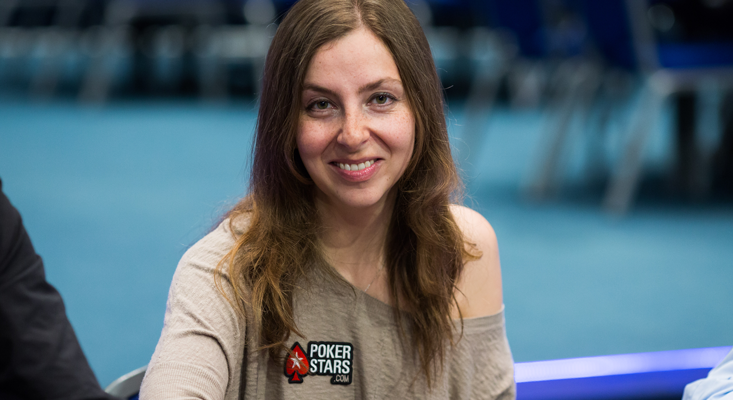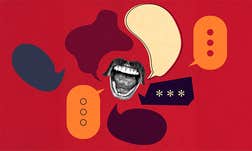Poker players like to brag they win with skill not luck. So do investment bankers. Scientists. And writers. Skill, we insist, is our ticket to success. Who can blame us? It’s a useful delusion to bank our identity on skill, says Maria Konnikova. We can’t stand trembling in the chaos. And skill does matter. That skill can ever be enough, though, is “the biggest bluff,” writes Konnikova in her new book by that name.
A contributor to The New Yorker, Konnikova spends her 326 pages wisely. She recounts learning to play poker and in just over a year beating the pros. Thankfully The Biggest Bluff doesn’t strain to picture a Las Vegas underworld of social outcasts schooled in smoky Tenderloin bars. The poker outlaw is fable; tournament halls now glisten like Silicon Valley conferences, with the occasional woman, and celebrity.
Konnikova tells a contemporary story of the poker world, peopled with players sharp in math and psychology, notably her mentor, poker pro Erik Seidel, who sounds like a sage gent. Best of all is the personal arc of Konnikova’s poker education, textured with research from the scientists who resonated with her as she earned a Ph.D. in psychology, and had roles in her previous books, Mastermind: How to Think Like Sherlock Holmes, and The Confidence Game: Why We Fall for It … Every Time.

The first serious thoughts Konnikova gave to poker came while reading Theory of Games and Economic Behavior by mathematician and pioneering computer scientist John von Neumann. In The Biggest Bluff, Konnikova quotes the great scientist, who saw poker as the ideal model for game theory. “Real life consists of bluffing, of little tactics of deception, of asking yourself what is the other man going to think I mean to do,” von Neumann wrote.
In an early draft of The Biggest Bluff, Konnikova spiked the conclusion with a few too many stabs at self-help psychology, the notion you make your own reality, that kind of thing. “My editor was like, ‘You know, maybe you want to take this part out a little because it would be really good if Oprah likes your book!’” Konnikova says, laughing. What makes the ending of The Biggest Bluff moving is the newly successful poker player staring into the face of uncertainty. I crafted my questions for Konnikova to talk about her psychological journey, and she obliged with candor and cheer.
You got into poker “to better understand that line between skill and luck, to learn what I could control and what I couldn’t.” Why did you want to better understand the line between skill and luck?
I had a lot of unlucky things happen to me in a short period of time. I got sick with a strange autoimmune condition that no one could diagnose. I found myself stuck in my apartment for days on end with a lot of time to think. Around the same time, my grandmother died. It was a freak accident. She was independent, living by herself, healthy, and slipped in the middle of the night. People in my family lost their jobs. All of these things kept happening and I realized you don’t think how lucky you are when you’re lucky. You don’t wake up in the morning and say, “Today’s a lucky day. I’m healthy. How great is that?” We take things for granted. When things go wrong, we realize there’s no such thing as a self-made man. That’s a completely bullshit mantra. There’s no such thing as the American dream. I wrote up a few pages for my agent, some general thoughts on luck, and I went on a rant against the American dream, and she said, “Fascinating. Now give me a book proposal, this ain’t it.” I started researching and that’s what brought me to poker.
What scientific research spurred you on your journey?
A lot of it was research I’d done when I was getting my Ph.D. with Walter Mischel. We designed studies on risky decision-making and self-control. We thought if you put someone who’s smart in conditions with a lot of uncertainty and risk, people who are high in self-control, who’ve been successful, are going to do better than people who aren’t. We were inspired by the 2008 financial crisis. Did people high in self-control make things better? Would the crisis have been worse otherwise? And we found something unexpected: People high in self-control did worse because they were likely to be seduced by the illusion of control, to think of themselves as having more agency than they did. Successful people were taking much more credit for the good stuff and dismissing all the bad stuff. “That’s just noise. I don’t have to pay attention to it.” In our study, when we switched an environment on them, they didn’t learn. People who weren’t as high in self-control, weren’t as self-confident, said, “Oh, shit, I’m losing money. I better figure out what’s going on.” They ended up doing better. So I became fascinated by the illusion of control. It’s a very useful delusion. It behooves us to think we’re more in control than we are. If we realized how little agency we have, we’d all go insane.
I thought of myself as a good model for women, someone who stands up for myself. How can this be me?
You wrote, “Who you are comes out at the poker table.” Who were you when you first sat down at the poker table?
I was a girl! I say that disparagingly to myself. I was really upset with myself, to be perfectly honest. I didn’t realize I had internalized so many gender stereotypes and so much socialization from my environment. I study gender stereotypes. I have a Ph.D. in psychology. I thought of myself as a good model for women, someone who stands up for myself. How can this be me? I’d be passive. I’d let people bully me. I’d fold. I would know I was making a mistake but couldn’t get the nerve or desire to do anything about it because I didn’t want tension. I didn’t want people to think, “Oh, she’s that bitch who’s been raising me all the time.” I wanted people to like me. Even when I had really good cards, I didn’t make nearly as much money as I should’ve with them because I’d end up folding or not raising. I didn’t want to upset people. I realized this is a big problem and something I have to work on. And not just in poker. I told myself, “You better get your shit together in real-life situations. You’re probably a doormat a lot of the time and don’t realize it.”
How did you think about luck when you started playing?
When I started playing, I made the mistake a lot of bad poker players make. I thought luck is something that happens to me. In grad school, I was inspired by Julian Rotter’s locus-of-control research, internal locus versus external locus. Internal locus of control is, “I have agency, I control what’s happening.” External locus is, “Things are happening to me.” I thought of luck as total external locus of control. And in some ways, it is. That’s what luck is. Luck is variance, it’s chance, it’s noise, it’s stuff that happens.
But I was seeing myself as this helpless pawn being tossed by the winds of fate, to get melodramatic. My coach Erik noticed that and said, “You’re using the wrong language to describe things. You’re describing things as happening to you, and that’s very worrying. You can’t think that way. You have to get that internal locus and say, ‘OK, sure, these things are happening, but what am I doing? Don’t focus on the luck. Don’t focus on the variance. Don’t focus on what’s happening to you. Focus on what you’re doing, and what you can do to reclaim agency. Rather than saying, ‘Oh my God, I can’t believe my aces cracked,’ say, ‘I made the best decision possible. I got my money in with aces and I couldn’t have done anything differently. I’m going to win there 75 percent of the time. I made the right choice, end of story.’”
A psychologist and “mental game coach,” Jared Tendler, tells you, “You don’t want future Maria to beat the shit out of you.” What’s the lesson?
That future Maria is a bitch! That’s what I took from it. He said I’m making a lot of decisions right now because I’m scared about what I’ll think of myself in the future. I’m judging myself in advance. Future Maria might say, “Oh, I can’t believe you lost this tournament, I can’t believe this.” He said, “Just forget about that.”
In a Nautilus interview, poker pro Annie Duke said, “The problem is we’re all resulters at heart.” I took her to mean you can’t be haunted by results. Stay focused on the quality of your decisions, the process.
That’s absolutely right. That’s the heart of poker. That’s the most important lesson that poker can teach you: Focus on the process. Poker is very much a stoic philosopher’s game. The stoics would kick ass at poker because you focus on your decisions, your emotions, your actions, and reactions. The rest is just bullshit. “BS in your mind” is what Erik called it. You can’t control it. The stoics were so strong on figuring out what you are in control of, and just letting go of everything else because it’s not in your power. I mean, they went a little too far. Epictetus has passages like, “My wife dies. OK, move on. I can’t do anything about it.” I’m like, hold on a second.
What’s a “luck amplifier?”
[Laughs] A luck amplifier is a term I came up with to explain how a mind-frame shift can help you get more when luck is on your side. If you’re thinking correctly, you have internal agency, and you’re executing, that’s going to amplify any luck in your vicinity. You’ll be a more pleasant person and more opportunities will come your way. People will remember you as someone who said, “Yes, this bad thing happened,” but you were ready to go, you were excited for the next thing, your mind was in the right place. Now you’ll have more of a chance to take advantage of luck because you’re open-minded, you’re ready for it, you’re observant, you’re taking things in. You’re someone who’s in an approach-oriented psychological state.
What’s the opposite of a luck amplifier?
A luck dampener! It means things are happening to you, you’re complaining to everyone about your bad cards, and no one wants to hear it anymore. When opportunities come up, people will say, “Oh, I’m not going to give those to Maria. I’m not going to tell her about it. I don’t want to talk to her, she always depresses me whenever I talk to her.” Someone else is going to be top-of-mind. You’re not open-minded because you’re focused on feeling bad for yourself, you’re in an avoidance mind-frame, and that’s going to dampen any potential luck. You made a choice that kept a lot of opportunities away from you.
Sometimes the math guys are the easiest to play against. They miss a lot of the psychological elements.
The British mathematician and author David Hand has a nice line, “Luck is chance with a human face.” Sounds like you agree.
Yes. Chance is just chance. It’s just noise. It’s just randomness and humans created this idea of luck—good luck, bad luck, fate. You give it not just a valence but a direction. That’s all human invention, our way of dealing with the noise of the universe.
And we don’t cope well with chance.
We don’t. The brain doesn’t like uncertainty. We want to know. We want answers. We want a clean story. We want cause and effect. That’s why we put labels on things, that’s why our minds like to categorize. We want certainty. That’s how we experience the world.
What are your methods for dealing with uncertainty?
Poker is a game of information and information-advantage—true of almost anything in life. The person who has the best information is going to make the best decision, is going to win more of the time and put herself in a position to win more of the time. But what’s information? Information is statistical analysis, calculating the odds and figuring out what range of hands you and others could possibly have. It’s also about the players. If they’re a more aggressive player, they’re going to have a wider range. If they’re a more conservative player, they’re going to have a tighter range. There’s also the psychology. What’s your dynamic? Have you played together before? Do you have a history? Is this person perceiving you in a certain way? There are variables after variables, and you have to be aware of all of them as they keep changing. It’s a constant adjustment, it’s a constant mental calculus. Poker players, whether they know it or not, are much better Bayesian thinkers than a lot of other people because you have to constantly be updating your information and the resulting decision.
The brain doesn’t like uncertainty. We want to know. We want answers. We want a clean story.
What’s the heart of your method?
Pay attention. It’s the first thing Erik taught me. You have to be present. And you have to pay attention to yourself. What am I thinking? What am I experiencing? How am I seeing this situation? What biases am I bringing to bear on this? How do other people see me? Being mindful, being present, are really hard. Our brains are really bad at paying attention. The brain’s default mode network undermines us at every step. It makes us creative and does wonderful things. But we’re just constantly scanning the environment. It’s hard to focus. Focus is not our default state. Our default state is mind-wandering. That’s why modern technology is so addictive. It’s junk food for our brain because it’s what our brain wants. “Oh, Yay! So many things to play with. I never have to focus on anything.” Focus takes effort.
“Tells” are part of poker’s lore. Can you spot something that tells you a player is bluffing?
Oh, sure. But most of determining whether someone is bluffing isn’t physical, it’s dynamic, it’s psychological, it’s how they’re telling their story and whether there’s inconsistency there. That said, there are physical tells. I once played with someone who was just a gift. Every time he didn’t like the flop, which are the first three cards that come out, and which are the community cards, he would look at it, and if you looked at him while he was looking at it, you knew right away whether he’d hit it or not, because his body language would just change. If he didn’t like it, he would just slump completely and he’d just get smaller, and if he liked it he’d be much happier looking. He’d be sitting up, he’d be ready to play. It was just like clockwork.
The poker pro Phil Galfond tells you, “What you need to know first and most important of all is that poker is storytelling. It’s a narrative puzzle. Your job is to put together the pieces.” What did he mean?
He means, “Does the player’s story make sense?” You have to learn to not just look at the emotional arc of it, but look at how the story is structured. Does this make sense? Are the characters well motivated? What’s the logic here? I’ve used that advice in my writing. Does this argument make sense? Does the story this person is telling you make sense? Phil goes on to say, “Sometimes I know what people will do better than they know themselves.” He’s a brilliant player. He knows how they told the story but they don’t because they haven’t done the self-analysis. Stories are the way we see ourselves. Our conception of self is so much about myth-making. You make sense of the world and tell stories to try to figure out how did this get there, why am I seeing this here? Why is this happening? What’s our sense of self, our sense of purpose?
You say, “I should raise him because he’s an asshole.” But that’s not your good self.
Plenty of pro poker players have graduate degrees in math and are experts in probability. How do you fare against them?
Sometimes the math guys are the easiest to play against. They’re going to be on their phone a lot of the time. They’re not paying attention because they know what they have to do with this hand. They know you raise it 23.2 percent of the time. They studied it and have the answer. And they’re great online. Online, they will crush my soul. But live, I can take advantage of that because they’ve missed some information I’ve not missed. They’ve not noticed how certain players play, but I have. They’re missing a lot of the psychological elements. Because I know how mathematical they are, I can play a certain way.
I had one hand against one of the best players in the world, as brilliant as they come when it comes to mathematics. I’m not going to say who or what his background is because I don’t want to name names. He’s attentive at the table, but at the end of the day he’s governed by math. We were in a World Series of Poker together and I ended up making this really crazy play. I knew I had the best hand and I knew he wouldn’t be able to fold because he would have calculated that I have so many different bluffs in my range, and that his range has to call. If he was a normal player, I would never have over-bet, put that much money in the pot, because they would’ve folded, they would’ve gotten scared. But I knew he had already done the calculations and that he would call, and he did. I knocked him out of the tournament.
You took advantage of his rigid thinking?
I took advantage of his mathematical prowess, yes.
What do you mean, “Tilt makes you revert to your worst self”?
The moment we’re on tilt, the moment emotion seeps into our decision process, we’re no longer thinking rationally. We’re no longer making probabilistic calculations, reading people, paying attention. You’re angry at someone, they got under your skin, so you make a decision because you’re angry. You say, “I should raise him because he’s an asshole.” But that’s not your good self, that’s not your clear-thinking self. That’s the version of you that didn’t know better.
Near the end of the book, you quote Carl Sagan on the awe of the universe: “How pallid by comparison are the pretensions of superstition and pseudoscience.” Why did you include Sagan?
It brings everything full circle. Sagan was awed by chance. He didn’t let it get him down. Instead he wants us to look at this beautiful universe, this beautiful world. Look at how many things there are to amaze us, to fascinate us. Look at the power of wonder, embrace it, and don’t be afraid there are things we don’t know. Don’t be afraid of uncertainty, be grateful for it. Would you want to live in a world where you knew everything and where everything was determined? He hated superstition, as do I. Don’t take the easy way out. Don’t give up agency. Don’t have these stupid rituals. Science is beautiful. Lack of knowing is beautiful. All of these things we can’t control are beautiful. They’re powerful. They make us human. They make life worth living.
You yourself write, “We are in the end nothing more than interpreters of static.” What kind of mood were you in when you wrote that line?
A very existential mood.
Is it a grim or a positive line?
It’s a positive line. You want to be as empowered as possible. Delusions are not empowering. Delusions keep you from being a better version of you. So, yeah, we are interpreters of noise. So what? Interpret to the best of your ability, ask to the best of your ability. Try to be a good decision maker, try to be a good human. Just because most of the world is noise doesn’t mean you have no responsibilities. It’s on us to make something meaningful, something good, something lasting out of the noise.
Finally, you made a decision to conclude your book with a story about a frightening health scare. Why did you include that scene?
I have no idea. It felt right. In retrospect, it showed how much I had come from the beginning. I lost my vision. It was the scariest thing that ever happened to me. I thought I was having a stroke or an aneurism. There was something very bad going on in my brain. I knew enough to be extremely scared. Everything was uncertain at that moment and I didn’t know if I’d ever see again. Yet I managed to stay conscious. I managed to hold onto something, to not fall, to call for my husband. I knew the most important thing I can do right now is stay calm. I don’t think the me before this journey would’ve been able to do that. I don’t think I would have been able to control my emotions, control my fear.
Poker saved your life.
In a way, it did.
Kevin Berger is the editor of Nautilus.
Lead image: IRINA SHI / Shutterstock


























